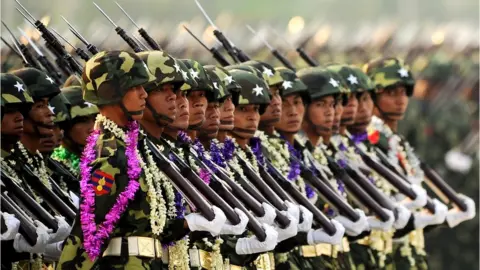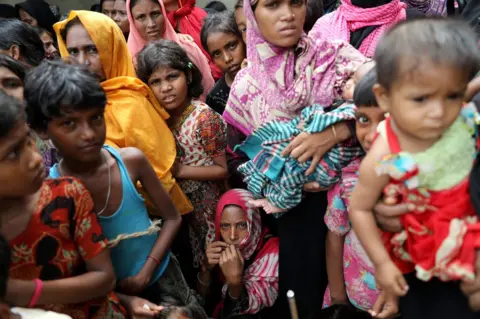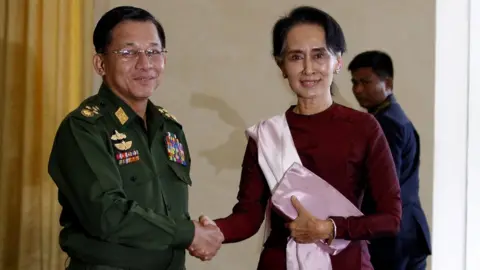Myanmar military leaders 'guilty of crimes against humanity'
 AFP
AFPTop Myanmar military officials should be tried for crimes against humanity for a systematic attack on Rohingya Muslims, Amnesty International says.
Soldiers targeted villagers in a co-ordinated campaign of rape, torture and murder, the rights group alleges.
It also says the military prepared its offensive before attacks last year led 700,000 people to flee. Myanmar has always said they were the trigger.
There was no immediate reaction from the military, which denies any abuses.
The Amnesty report was published shortly before the UN's special rapporteur on Myanmar said there was no evidence conditions for Rohingya Muslims had improved since August last year, when violence erupted.
Yanghee Lee told the UN Human Rights Council any discussion of a safe, voluntary and dignified return was futile. In response, Myanmar's ambassador told the UN Ms Lee lacked independence, and called for her to be replaced.
What happened in Myanmar?
In its report Amnesty released what it says is detailed evidence of the military's crimes during the brutal crackdown on the Muslim minority.
In August 2017, Rohingya militants - the Arakan Rohingya Salvation Army (Arsa) - attacked several police posts in Rakhine state.
The military responded by launching a major operation it said was targeting the militants. The military action forced tens of thousands of people from their homes and saw entire villages burned down.
About 700,000 Rohingya have now fled to Bangladesh, where they are living in refugee camps.
Who are the Rohingya?
The Rohingya are one of the many ethnic minorities in Myanmar and make up the largest percentage of Muslims.
The government, however, sees them as illegal immigrants from Bangladesh and denies them citizenship. They are widely despised by the Burmese public.
Before the crisis, there were about one million Rohingya in Myanmar, with the majority living in Rakhine state.
What does Amnesty say?
The report, titled We Will Destroy Everything, says: "The ethnic cleansing of the Rohingya population was achieved by a relentless and systematic campaign in which the Myanmar security forces unlawfully killed thousands of Rohingya, including young children."
The rights group accuses the military of sexual violence, torture, forced displacement and burning of markets and farmland to force communities to flee.
"These crimes amount to crimes against humanity under international law, as they were perpetrated as part of a widespread and systematic attack against the Rohingya population," the study says.
 Reuters
ReutersAmnesty also says it can prove the Burmese military had been gearing up for an offensive against the Rohingya before the August violence. The government has always said it was responding to a specific threat from Arsa.
The report is based on more than 400 interviews in Myanmar and Bangladesh, satellite imagery, forensic analysis and confidential military documents.
Who are the accused?
Amnesty names 13 top officers as being most culpable and says they should be put on trial at the International Criminal Court (ICC) in The Hague.
 Reuters
ReutersThe list includes army commander-in-chief Min Aung Hlaing and former head of the western command in Rakhine, Maung Maung Soe, who earlier this week was sacked by the military.
The report also includes several low-level commanders and soldiers Amnesty says played a critical role in specific incidents.
Will they go to court?
Myanmar has not ratified the Rome Statute of the ICC and is not bound to co-operate with it.
Bringing a case would require the approval of all five permanent members of the UN Security Council, and China has until now given its support to the Myanmar government's handling of the crisis.
That makes it very unlikely the military figures will be tried.
Under the Burmese constitution, drawn up after years of military leadership ended, the military still holds a quarter of seats in parliament. Unlike most countries, the army acts independently of the government.
What is Myanmar's stance?
Myanmar has not responded to the Amnesty report but has in the past always maintained the crackdown was a justified response to a specific terrorist threat.
The army has also insisted that any investigation into possible wrongdoings would be done internally.
In a November 2017 investigation, the Burmese army exonerated itself of any blame regarding the crisis.
Several individual soldiers though, have since been prosecuted and sentenced for particular incidents.
